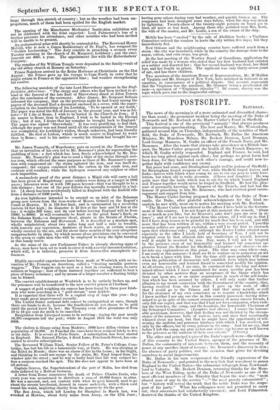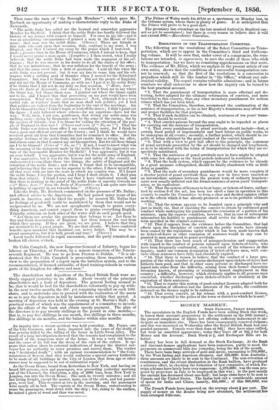POSTSCRIPT.
SATURDAY.
The news of the morning is of a more animated and diversified charac- ter than usual ; the prominent incident being the meeting of the Duke of Newcastle and Mr. Roebuck at the Master Cutler's Feast in Sheffield.
This festival is one of the provincial " annuals " that always produces some interesting speechmaking. The host and Master, Mr. Wostenholm, gathered around him on Thursday, independently of the notables of Shef- field, the Duke of Newcastle, Mr. Roebuck, Mr. Dallas the American Minister, Mr. Monckton Milnes Mr. Beckett Denison, Lord Denman, Lord George Manners, M. Gudin an officer of the French Navy, and Mr. Bessemer. After the toasts that always take precedence at a British ban- quet, the Master Cutler proposed the health of the French Emperor ; to which M. Gudin wittily responded. England and France, he said, had been too long pitted against each other ; but perhaps no great harm had been done, for they had tested each other's courage, and could now to- gether fight with confidence any enemy. But peace had come, and Birmingham might well be jealous of Sheffield ;• for Birmingham forged weapons of war, while Sheffield forged knives and forks—knives with which when young we use to cut our pens to write love- letters, but when old to write accounts. (Cheers and laughter.) He was quite sure that the knife which was to cut the tie which bound England and France together would never be forged in Sheffield. He had the plea- sure of personally knowing the Emperor of the French, and had had the honour of presenting to him Mr. Bessemer, who had received great encou- ragement and support from him.
The Master Cutler having proposed the health of the Duke of New- castle, the Duke, after grateful acknowledgments for the kind re- ception he Neater Nj!:11Vheasntreolflerrthednototi..ehi: meeting with Mr. tte)`. Govern- ment of this country. I do not forget at this moment the remark, Abuse me as much as you like, but for Heaven's sake don't pass me over in si- lence' ; and if I am not to depart from this axiom, all I will say is, that I feel I have deep reason to be grateful for much that has been said, and still more that has been written of me, within a very recent period. Upon this occasion politics are properly excluded, nor will I be the first to encroach upon that wholesome rule lately and, although the Master Cutler alluded more especially to the office I lately held of Secretary of War, I will not be tempted even by that allusion into any vindication of myself, however well it might be received by you. Nay, more, I will not be tempted by the presence even of my honourable and learned but somewhat ag- gressive friend the Member for Sheffield—(Laughter and cheers)—to en- ter into any explanations on this point. The time may come when—nay, I am ready at this moment—I shall see fit to venture on so audacious an act as to break a lance with him. But the time still more probably will come when the publication of documents will establish facts which may induce even my honourable and learned friend to somewhat modify his opinion. At all events, you will, I am sure, be convinced that the long and deter- mined silence which I have maintained for many months past has been dictated by other motives than an acceptance of the blame which has been cast upon me, or an entire acquiescence in much of the self-lauda- tion which has been assumed by others. I will only make this further allusion to my recent connexion with the Government of the country, that, having resolved from the hour that I gave up the seals of office that I would go to the Crimea and visit that army myself, as well for the clearance of my own conscience as to acquire a knowledge which I knew neither I nor an one else in this country possessed—having deter- mined to go in spite of the earnest remonstrances of many sincere fnends, I only felt one regret, and that was that I had not fora companion, when visit- ing the trenches, the camp, and the hospitals the honourable Chairman of the Sebastopol Committee. (Laughter and Aeers.) I assure the honour- able gentleman, however, that that feeling was not dictated by the circum- stance of the numerous balls of various sorts and sizes that occasionally whizzed about my head, but that he might have the opportunity of wit- nessing the uniform and generous kindness with which I was received, not only by the officers, but by every. private in the army. And let me say, that before I left the camp, my gray Jacket and white cap became as well known to the privates as the uniform of their own officers.' (Cheers.)
The other and principal topics of the Duke's speech were—the relations of this country to the United States, apropos of the presence of Mr. Dallas, the community of interests between them, and the necessity of peace at any sacrifice short of honour; Mr. Bessemer's discovery in iron ; the absence of party politics, and the occasion that gives for devoting ourselves to social improvements. Mr. Dallas in his turn reciprocated the friendly expressions of the
Duke of Newcastle; pointed to the new link that was about to annex England to the United States—the submarine telegraph from Newfound- land to Valentia. Mr. Beckett Denison, returning thanks for the Mem- bers of the West Riding, spoke of the Duke of Newcastle as one of tho most efficient members of the Ministry that began the war—the "most abused man of any in the service — the most grossly calumniated" ; but " history will reveal the truth that the noble Duke was the scape- goat of his party." What his colleagues were not permitted to carry out, their successors had satisfactorily executed ; and Lord Palmerston deserved the thanks of the United Kingdom.
Then came the turn of " the Borough Members" ; which gave Mr. Roebuck an opportunity of making a eharacterietie reply to the Duke of Newcastle.
"The noble Duke has called me the learned and somewhat aggressive Member for Sheffield. I think that the noble Duke has hardly followed the history of my doings with respect to himself. For once in my life—and it was an astonishing circumstance—I praised a man in the House of Com- mons ; that man was the nobld Duke. (Cheers.) There are Mends at this table who said upon that occasion, that, contrary to my wont, I was illogical, and that I ruined my cause by the praise which I bestowed. I made a promise then in the House of Commons, which I intend to keep, that I would never praise a man again. (Laughter.) I then stated, what I really believed, that the noble Duke had been made the scapegoat of his col- leagues ; that he was sincere in his desire to do all the duties of his office ; that he was industrious; that he was sedulous for the benefit of the army ; and that the army owed him a debt of gratitude. I said all this when the noble Duke was not present : but it was my fate to rouse him and his col- leagues with a rattling peal of thunder when I moved for the Sebastopol Committee. But was I to blame for that ? Did not the people of England, and did not the House of Commons, go with me? I put it to the noble Duke if he thinks that I did not do my duty on that occasion. ("Hear, hear !" from the _Duke of Newcastle, and cheers.) Far be it from me to say where the blame lay, but blame there was. I pointed out where the blame ought not to lie, and I hoped that that proceeding on my part would have been remembered. What were the circumstances ? Now, although it is a very. useful rule at Cutlers' feasts that no man shall talk politics, yet I find that politics are talked from the beginning to the end of the meetings. Am Ito be blamed for that ? I didn't begin or lead off the dance , I didn't point out the figure : I only followed where others—far my superiors—have led the way. Well, then, I ask you, gentlemen, that seeing our noble army was melting away—dying by thousands—not by the arms of the enemy, but by the neglect of friends—was I to blame for calling the attention of the peo- ple of England to that fact ? (Cheers and cries of " No, no !") That the noble Duke was driven from office I am exceedingly sorry, for I think he was a good and efficient servant of the Crown ; and I think he would have received great aid from that Committee had he remained in office. But the peculiar feelings of the noble Duke did not enable him to retain his office, and others came in that I cannot say are his superiors. But for all these things am Ito be blamed ? (Cries of "11 o, no .1") If not, I want to know what was the meaning of the statement made by the noble Duke of the aggressive na- ture of the honourable Member for Sheffield ? I was aggressive, but it was on your behalf. I was aggressive, but it was for the noble army of England. I was aggressive, but it was for the honour and safety of the country. I endeavoured to conciliate those two things, the safety of England and the retention of the noble Duke; and when I found that to be incompatible, and believing that the one was far superior to the other, I threw myself and all that were with me into the scale m which may country was. If I forgot the noble Duke, I beg his' pardon, and I hope I shall obtain it. I shall pass from that subject. I think I may say that I have vindicated myself, and that there is nothing in the mind of the noble Duke of asperity towards me —(" Hear, hear !" from the Duke of Neweaetle)—as I am quite sure there is nothing of asperity in me towards him." (Cheers.)
Like the Duke, Mr. Roebuck commented on the presence of Mr. Dallas ; and offered advice to the Americans. He had passed many years of his youth in America, and he liked the people : he assured Mr. Dallas that no feelings of good-will could be manifested by them that would not be reciprocated by us. We are not sycophantic enough to praise eve thing American, and cannot expect them to praise everything English. Friendly criticism on both sides of the water will do each people good.
" Let them not grudge the greatness that belongs to us. Let them be free and frank descendants of England. Let them honour the root from which they sprang. If they are great, we are great. I believe that they are destined to be a great people. We are that already. We have conferred benefits upon mankind that mankind can never forget. This may be a proud assumption, but it is both proud and true." (Cheers.)
Local toasts followed in rapid succession, and the party remained un- broken till eleven o'clock.



































 Previous page
Previous page